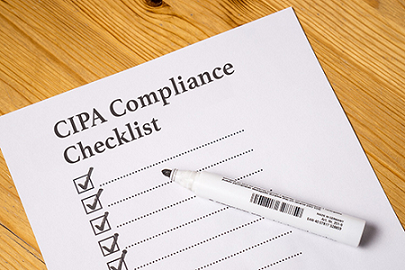CIPA Compliance Checklist
Libraries and schools that intend to apply for E-rate discounts on Internet connections and access services should comply with the Children’s Internet Protection Act (CIPA). This is proof that the institutions have implemented Internet safety policies and that they filter their Internet services.
CIPA compliance is overseen by the Federal Communications Commission (FCC). To achieve this, the FCC stipulates guidelines relating to Internet filtering as well as CIPA policy requirements.

CIPA Compliance Checklist for Students’ Online Safety
Internet Filtering Provisions
CIPA requires schools and libraries to implement a technology protection policy or an Internet filter. This is meant to block minors from accessing websites that are deemed to be obscene and harmful. Filtering should be enabled on all Internet-enabled computers, irrespective of whether adults or minors use them. For E-rate discounts purposes, filtering can be disabled for the benefit of adults who wish to conduct “bona fide research” and for other lawful purposes.
To ensure that minors only access appropriate content, schools and libraries should incorporate filtering into the service provided by the ISP. Filtering should also be done locally for Internet-enabled devices on a networked basis. Likewise, filtering ought to be done individually on every Internet-enabled computer used in a school or library.
CIPA Compliance Checklist: Internet Safety Policy
CIPA compliance regulations require schools and libraries to adopt and enforce an Internet Safety Policy publicly. The policy covers the aforementioned Internet filtering provisions. The policy should address the monitoring of minors’ online activities as well as the security and safety of all kinds of direct electronic communications. The unauthorized disclosure of personal information and unauthorized online access should similarly get addressed.
When checking out policy provisions relating to CIPA compliance, schools and libraries should ensure that filtering is provided for Internet-enabled devices used by students, staff, and other patrons. The policy also needs to govern Internet safety awareness among minors besides stipulating how their online activities will be monitored. During the implementation of an Internet Safety Policy, schools and libraries should focus on the secure and safe usage of direct electronics communication platforms by minors.
The policy needs to prohibit unlawful online activities such as hacking. The unauthorized disclosure, use, or dissemination of minors’ personal information should be prohibited. The Internet Safety Policy can only be adopted after public notice is issued, and after more than one public hearing is held. CIPA compliance requires schools and libraries to ensure that all Internet Safety policy guidelines are met.
How to Become Certified?
CIPA compliance regulations require schools and libraries to adopt technology and cybersecurity strategies for safeguarding minors. As EdTech becomes more prolific, cyberattacks have become more sophisticated.
To ensure that they fulfill obligations outlined by the CIPA compliance checklist, schools should take advantage of integrated cybersecurity solutions. This will go a long way in keeping students safe online besides protecting the networks of schools and libraries from cyberattacks. Likewise, schools and libraries should partner with providers of network security solutions, such as NuEduSEC.
Since CIPA compliance is meant to keep minors out of harm’s way when using the Internet, schools can become compliant by implementing the necessary Internet safety guidelines. The online safety of minors can be maintained by leveraging the available technology. Similarly, schools and libraries should prevent unauthorized access to harmful content by minors.
Should Internet Safety Services Be Outsourced?
Outsourcing Internet security solutions might seem expensive, but it is worthwhile. NuEduSEC provides an array of network security solutions that offer protection against known and unknown threats besides filtering and blocking harmful content. These solutions are typically offered with CIPA compliance and E-rate in mind. NuEduSEC leverages a cloud-based platform to ensure the safety of young Internet users.
The tools that NuEduSEC avails also enable schools and libraries to define and implement CIPA-compliant Internet safety policies. By taking advantage of such tools, it will be easier for the institutions to become compliant. CIPA compliance guidelines require K12 schools and libraries to prove that they have enforced an Internet safety policy that also addresses technology protection measures that are in place. Such proof makes the schools eligible for E-rate Internet access discounts as well as federal funding.
Minors face a range of cyber risks. A CIPA compliance checklist is part of a broader strategy for keeping children safe online. CIPA emphasizes awareness as an essential facet when seeking to provide a safe online environment for both minors and adults. For compliance purposes, schools and libraries much ensure that they adhere to all CIPA guidelines. However, this alone isn’t enough. It’s crucial to find a network security solution that helps the institutions to safeguard their online environment besides empowering them to monitor minors’ online activities.